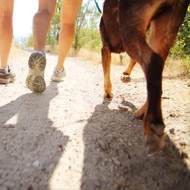2017 ‘worst year’ for Alabama rot, vets confirm

Owners are urged to seek advice from a vet if their dog develops unexplained skin lesions or sores.
Vets have confirmed that 2017 was officially the UK’s worst year for cases of Alabama rot after the number of confirmed cases almost doubled compared to 2016.
Veterinary specialists Anderson Moores said that eight new cases from December have just been confirmed, bringing the total number of cases in 2017 to 37. There have now been 143 cases in the UK since the disease was first identified in 2012, with 15 in January and seven in February so far in 2018.
“We are sad to announce eight more cases from 2017, making it the worst year so far for cases of Alabama Rot,” said David Walker, the UK’s leading expert on the condition. "It is understandably very worrying for dog owners, but we hope the increase in cases is partially due to a higher awareness and understanding of the disease.
“Although the figures have almost doubled since 2016, it is important that dog owners remain calm, but vigilant for signs of the disease, particularly over the coming months, as we are now in the peak season for cases of the disease.”
Alabama rot, clinically known cutaneous and renal glomerular vasculopathy, can cause skin lesions and often results in fatal kidney failure. Currently, there is no known way to prevent a dog from contracting the disease, although owners are urged to seek advice from a vet if their dog develops unexplained skin lesions or sores.
Dr Kim Stevens of the RVC is currently leading research into the disease, with funding from the New Forest Dog Owners Group and the charity Stop Alabama Rot. She is hoping to publish the results of her work later this year.
“This research will not identify the specific cause of the disease, but is designed to look for geographical patterns, as well as environmental and climatic risk factors,” Dr Stevens said. “An obvious pattern that we can see is linked to seasons, with the vast majority of cases occurring between November and March, and limited cases over the summer.
“We hope our ongoing research with Anderson Moores and the work that Vets4Pets are doing will take us closer to finding the cause of this nasty disease.”



 The Animal and Plant Health Agency (APHA) has updated its online reporting service for dead wild birds.
The Animal and Plant Health Agency (APHA) has updated its online reporting service for dead wild birds.